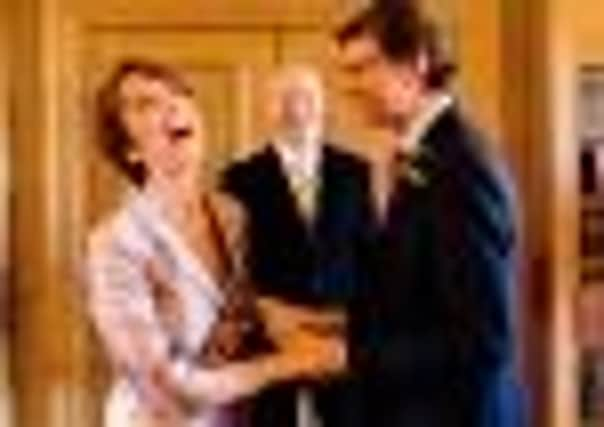The time has come to rewrite the laws governing weddings in Scotland, says Norman Bonney


Choices can be highly personal and all attempts to regulate what we can and cannot do seem certain to generate controversy.
The Scottish Government’s proposals to relax the law that only allows gay civil partnership ceremonies to be conducted by registry office staff has prompted protest from the Catholic Church.The government wants to allow, but not require, churches and faiths to undertake these ceremonies.
Advertisement
Hide AdAdvertisement
Hide AdDelving into the background of this heated debate offers some interesting insights into the choices that couples are making in modern Scotland.
For a start, the phenomenon of gay marriage is relatively uncommon. Gay civil partnerships totalled 465 in Scotland last year – less than two in every 100 matches. Getting married through the registry office is now the most common choice of all couples in Scotland, with civil marriages now just outnumbering religious ceremonies with 14,449 civil marriages in Scotland last year compared with 14,030 religious ones.
While the Church of Scotland is the most favoured denomination – performing just over one in five weddings – the Catholic Church, despite, or perhaps because of, its strident views on moral issues relating to marriage, now only undertakes about six per cent of Scottish weddings.
Catholics must be deserting their church for weddings in large numbers because according to the 2001 census they constituted 16 per cent of the Scottish population.
Advertisement
Hide AdAdvertisement
Hide AdThe big story about Scottish weddings is the large number of humanist weddings. Humanists, who reject conventional religion and do not believe in life beyond this world, performed more than 2000 weddings – making it the second most common provider of authorised wedding services that are not undertaken by civil registry office staff – ahead of the Catholic Church.
The rise of the humanist wedding service is another indication, along with the popularity of civil marriages, that conventional religions are losing their grip on Scottish people’s thoughts and behaviour. In the words of the Scottish Humanists’ campaign at the time of the Pope’s visit in 2010 – “two million Scots are good without god”.
As well as the growth of secularism, as reflected in the popularity of registry office marriages, and humanism, as reflected in the growth of humanist weddings, there has also been a proliferation of weddings performed by a considerable array of sects, faiths and denominations. More than 40 different types perform weddings in Scotland according to the official statistics – from the Assemblies of God to the Pagan Network, the King Fahad Mosque, and the Spiritualists National Union.
Would it not now make sense for all weddings to be legally required to be undertaken by registry office staff? Staff would thus be freed of the task of trying to certify that religions and personnel that conduct weddings are suitably qualified. Newlyweds would then also be free, after civil registration, to celebrate their weddings as they choose and religions would not have to be subject to state regulation as to how they perform wedding celebrations.
n Norman Bonney is the convener of the Edinburgh Secular Society. Visit www.secularism.org.uk for more information